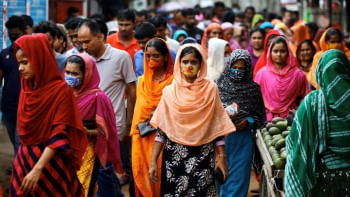UK notes concern over civil society, press freedom
The United Kingdom has said new policies and legislation developed in Bangladesh this year have generated concerns about restrictions on civil society space and media freedom.
In its country case study update on Bangladesh, which forms part of the 2013 Human Rights, and Democracy Report, it also said the risk of political violence in Bangladesh remains a concern.
While political violence related to protests has declined since the elections in January 2014, NGOs have reported a spike in the number of extrajudicial killings and enforced disappearances in the months following the election, said the report.
It said Bangladesh's 10th parliamentary elections on January 5 were not contested by the former opposition 18-Party Alliance, including the BNP due to concerns that free and fair elections could not be held in the absence of a neutral caretaker government.
With over half the parliamentary seats uncontested, the Awami League won a second successive term, the report mentioned.
Twenty-one deaths were reported on polling day and over 100 school-based polling centres burnt down. Since the election, the BNP has committed to peaceful protest, and there have been significantly fewer enforced general strikes and transport blockades than in 2013, the report said.
A spike in the number of crossfire killings in January and February, allegedly perpetrated by law enforcers, drew condemnation from NGOs, it observed.
In May, seven men abducted in broad daylight and later found dead in a nearby river in Narayanganj drew domestic and international criticism.
Meanwhile, there has been pressure on space for civil society as the Bangladesh government introduces new legislation, or amends the provisions of existing legislation and regulation, said the country update report.
Those using digital media to criticise the government have been detained under the Information Communications Technology Act.
Proposed amendments to the Foreign Donations Act could limit the work of civil society if they add further procedural requirements to existing regulations governing NGOs in receipt of foreign donations, said the report.
Two other recent developments reinforce views among civil society members that the Bangladesh government is closing the potential channels for criticism or dissent.
A recently formulated National Broadcast Policy (2014) has generated concern over potential curbs on media freedom.
According to the Bangladesh government, the policy will strengthen accountability and responsibility in the fiercely competitive sector by providing “guidance” to in-house editorial boards on programme content, and by regulating licensing decisions and advertising standards.
broad scope of the “editorial guidance” has provoked widespread concern amongst journalists and civil society. Two TV stations and one newspaper have been fully or partially shut down, and some civil society organisations report increasing levels of surveillance, harassment and intimidation.
More recently, the government introduced a new Constitutional Amendment restoring Parliament's authority to impeach members of the judiciary.
Prime Minister David Cameron met Bangladesh's Prime Minister Sheikh Hasina on 22 July.
He expressed UK's disappointment over the January 5 election, said the report.
Both agreed on the importance of an open society and political system in which democratic political participation and media freedom are respected.

 For all latest news, follow The Daily Star's Google News channel.
For all latest news, follow The Daily Star's Google News channel. 



Comments